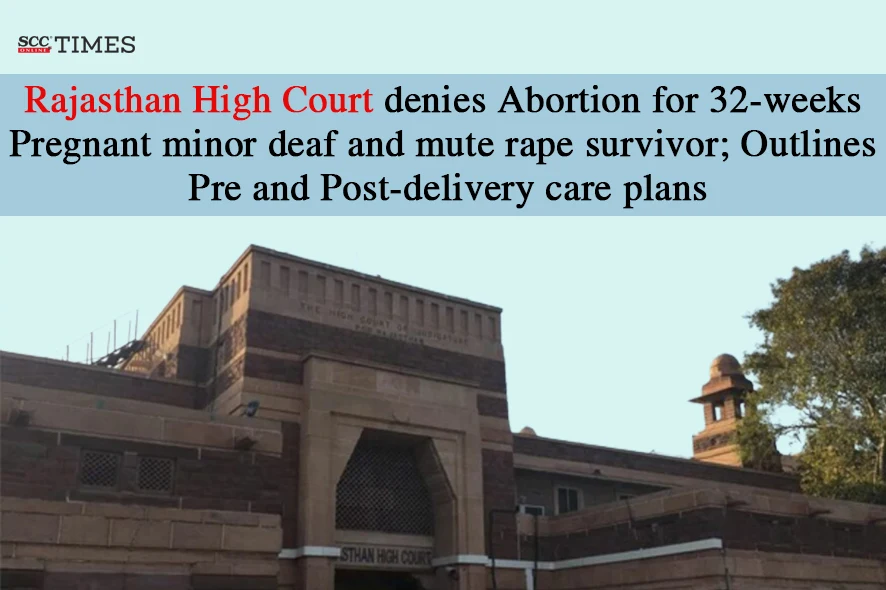Rajasthan High Court: In a writ petition filed by a minor rape survivor seeking permission to terminate her 32-week pregnancy, a Single-Judge Bench of Anoop Kumar Dhand, J. refused termination of pregnancy, holding that the termination would be unsafe and life-threatening for both the minor and the fetus, especially given the opinion of a medical board. The Court observed that the fetus was viable with a heartbeat and that the victim’s own health was weak, with a blood deficiency and low blood pressure. However, the Court directed a safe delivery and ordered that the child be handed over to the Child Welfare Committee.
Background
An FIR was lodged by the father of a 17-years-old minor deaf and mute girl, alleging that she was subjected to rape. The accused was charged with Sections 64(2)(h) and (m) of BNS, 2023, and under Sections 5I, 5j(ii), and 6 of the POCSO Act. The minor filed the present petition seeking permission to terminate her 32-weeks pregnancy resulting from the alleged rape.
Analysis and Decision
The Court perused the provisions of the Medical Termination of Pregnancy Act, 1971 (‘MTP Act’) which is a progressive legislation regulating the termination of pregnancies. The Court noted that Section 3 of the MTP Act spells out certain conditions which must be satisfied before a pregnancy can be terminated. The conditions depend upon the length of the pregnancy. Where the length of the pregnancy does not exceed twenty weeks, one Registered Medical Practitioner (‘RMP’) must be of the opinion, formed in good faith that, if the risk of the child is not there, then such permission can be granted. The maximum period which has been prescribed under Section 3 of the MTP Act is 24 weeks, wherein, permission from the Court is not required and such termination can be done by the registered practitioner, looking into the overall health condition of the person seeking termination.
The Court noted that where a pregnancy is caused by rape, the anguish caused by the pregnancy is presumed to constitute a grave injury to the mental health of the woman, and the MTP Act recognizes the autonomy of the pregnant woman and respects her right to choose.
Where the length of the pregnancy exceeds twenty weeks but does not exceed twenty-four weeks, at least two RMPs must be of the opinion discussed in the preceding paragraph. The Court also noted that Rule 3B of the MTP Rules (as amended in 2021) provides grounds for termination up to 24 weeks, including for survivors of sexual assault or rape, minors, change of marital status during the ongoing pregnancy (widowhood and divorce), women with physical disabilities, mentally ill women including mental retardation, etc.
The Court noted that in X2 v. State (NCT of Delhi), (2023) 9 SCC 433, the Supreme Court held that the benefits of Rule 3B(c) extend equally to both single and married women and that the benefits of Rule 3B extend to all women who undergo a change in their marital circumstances.
However, the Court observed that a Medical Board of five doctors had been constituted to examine the minor, and its report dated 06-08-2025 stated that the minor was carrying a 32-week pregnancy. The Medical Board was of the opinion that termination of such a pregnancy was not advisable and would be unsafe and would be life threatening to the mother due to advance gestational age. The Court observed that there was no material available on the record to differ with the opinion expressed by the Medical Board. Directing medical termination of this pregnancy, at such an advanced stage, would not only endanger the life of the minor but would also affect the life of the fetus in the womb.
The Court after discussing various precedents where various courts had declined termination of pregnancy and noted that there was no valid reasons to take a different view. Looking to the advanced stage of pregnancy (32 weeks) of the minor, her prayer for medical termination of pregnancy was not accepted.
The Court, hence, disposed of the writ petition with the following directions:
-
The Superintendent of Government District Hospital was directed to ensure all necessary medical facilities for the safe delivery of the minor.
-
The privacy and identity of the minor and the child were to be maintained.
-
The respondents were directed to admit the minor to Government Balika Grah and provide her with all necessary care, nutritious food, and medical assistance before and after delivery.
-
The Superintendent, Balika Grah was directed to allow the minor to remain there until she attained majority and to provide her with all facilities, including education.
-
The child, upon birth, was to be handed over to the Child Welfare Committee after the necessary documentation was fulfilled by the minor and her natural guardian. The minor would have no objection to giving the child to the State Agency for adoption to willing parents in accordance with the law. The adoption exercise would be conducted by the Central Adoption Resource Authority (CARA)/State Agency in accordance with the law, after taking the consent of the victim.
-
The Superintendent of the Government Hospital was directed to retain the tissue, cord, and blood sample of the fetus for DNA analysis by the Forensic Science Laboratory (FSL).
-
The Rajasthan State Legal Services Authority (RSLSA) and District Legal Services Authority (DLSA) were directed to pay a suitable amount of compensation to the minor rape survivor under the Rajasthan Victim Compensation Scheme, 2011, within three months.
[Victim (Minor) v. State of Rajasthan, 2025 SCC OnLine Raj 4143, 08-08-2025]
Advocates who appeared in this case:
For the Petitioner: Sonia Shandilya, Advocate
For the Respondent: Yash Joshi for Vigyan Shah, AAG


